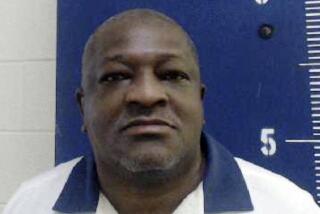Texas judge postpones woman’s execution
HUNTSVILLE, Texas -- A Texas district judge on Tuesday postponed the execution of a female inmate hours before she would have been the first woman put to death in the United States in more than two years.
Kimberly McCarthy, 51, was scheduled to be executed by lethal injection for stabbing her elderly neighbor to death in 1997.
State District Judge Larry Mitchell postponed McCarthy’s execution until April 3 after her lawyer successfully appealed for a delay, arguing the jury that convicted McCarthy of murder was improperly selected on the basis of race, according to court records.
McCarthy is African American and the Dallas-area jury that convicted her included one African American and 11 whites, according to Dallas County Dist. Atty. Craig Watkins.
Watkins, the first African American district attorney elected in Texas, has gained national attention for his efforts to address wrongful convictions, creating a conviction integrity unit and, this year, proposing legislation that would allow defendants to appeal convictions and sentences on the basis of race.
Watkins told the Los Angeles Times that the Racial Justice Act is due to be introduced in Texas soon. Other states have passed similar laws, he noted: Kentucky’s law, passed in 1998, allows a defendant facing the death penalty to seek a hearing under the act before trial; North Carolina passed similar legislation in 2009, although after Republicans won control last year they barred many statistics from being used, limiting defendants to direct evidence applying to their cases.
Watkins also noted that 40% of death row inmates are African American, compared with 11% of Texas’ population, and that most of those inmates who are later exonerated are minorities.
Texas has executed 492 inmates since it instituted lethal injection in 1982. Of those, about 46% were white, 37% African American, 17% Latino and a negligible percentage “other” race.
“We’ve seen in the past that race really has played a part in certain cases,” Watkins said. “It’s time for us to balance the scales of justice.”
Watkins said his office did not oppose postponing McCarthy’s execution, which relatives of her victim had planned to attend, according to Jason Clark, a spokesman for the Texas Department of Criminal Justice.
“We feel for the victims, and we know this prolongs things,” Watkins said, but he added that it’s important to be cautious and make sure officials do “everything possible to make sure this person was rightfully executed.”
He said that after he was elected in 2007, McCarthy’s case was among those his office reviewed for guilt or innocence, but that they didn’t delve into racial issues.
Female executions are rare. A dozen women have been put to death nationwide since capital punishment was reinstated by the Supreme Court in 1976, according to the Washington-based Death Penalty Information Center. Three of them were executed in Texas.
The first woman put to death in Texas after lethal injection was instituted in 1982 was Karla Faye Tucker, 38, of Houston. Tucker was sentenced to death in connection with the pickax murder of a couple during a burglary committed when she was 23. Her case stirred controversy given her sex, age, and statements she made to the press expressing remorse after she became a born-again Christian. She was executed on Feb. 3, 1998.
Unlike Tucker, McCarthy and the last woman executed in Texas, Frances Newton, are African American.
Prosecutors say McCarthy entered the Dallas-area home of her 71-year-old neighbor, Dorothy Booth, on July 21, 1997, ostensibly to borrow some sugar. Instead, McCarthy stabbed Booth five times, hit her in the face with a candelabrum, took her purse and cut off Booth’s left ring finger in order to steal her diamond ring, according to the Texas attorney general’s office. McCarthy later pawned the ring and used Booth’s credit cards to buy drugs.
The following year, a Dallas County jury found McCarthy guilty of murdering Booth and sentenced her to death. Her conviction was overturned by the Texas Court of Criminal Appeals in 2001 because no attorney was present when McCarthy was questioned after the crime even though she had requested a lawyer, court documents show.
She was tried a second time in 2002, again found guilty by a Dallas County jury and sentenced to death. That conviction was upheld by the Texas Court of Criminal Appeals in 2004, and the U.S. Supreme Court denied McCarthy’s appeal on Jan. 7.
McCarthy had previously been convicted of forgery, theft of services and prostitution, according to the attorney general’s office.
[Update, 4:45 p.m. PT, Jan. 29: There are 290 inmates on death row in Texas, 10 of them female. McCarthy on Tuesday had been held at the Huntsville Unit, about 70 miles north of Houston. Late Tuesday, she was transferred back to female death row at the Mountain View Unit in Gatesville.]
The last woman put to death in the U.S. was Teresa Lewis, 41, of Danville, Va. She was convicted in 2002 of using sex and money to arrange for the murders of her husband and stepson, and executed on Sept. 23, 2010, according to the Death Penalty Information Center.
The last woman executed in Texas, Frances Newton, 40, was convicted of fatally shooting her estranged husband and two children at their apartment outside Houston for life insurance money. She was executed on Sept. 14, 2005.
Since then, executions have changed in Texas. McCarthy, unlike Newton, will not be eilgible for a special last meal — the practice was ended in 2011 after legislators bridled at what they considered outlandish inmate requests.
McCarthy will also be executed using a different mix of drugs than Newton. Last year, Texas prison officials announced they were modifying the three-drug procedure used since 1982 “because the agency’s stockpile of the second drug expired and we were unable to obtain another shipment,” Clark said, referring to the drug pancuronium bromide, a muscle relaxant.
The state was forced to replace sodium thiopental with pentobarbital last March after the U.S. supplier of the former drug halted distribution amid international protests. Switching to pentobarbital, also known as Nembutal, raised the cost of drugs for each execution from $83.55 to $1,286.86.
Opponents of capital punishment had hoped the drug costs and shortages would slow executions in Texas and other states.
McCarthy would have been the second person executed in the United States so far this year, the first of the year in Texas. Forty-three inmates were put to death in 2012 nationwide, 15 of them in Texas, 11 of those minorities.
ALSO:
Iraq veteran on his double-arm transplant: ‘It feels amazing’
911 call as small plane hits Hudson River: ‘We’re in the water!’
Many Occupy protesters well-off, white and educated, study says
More to Read
Start your day right
Sign up for Essential California for news, features and recommendations from the L.A. Times and beyond in your inbox six days a week.
You may occasionally receive promotional content from the Los Angeles Times.







